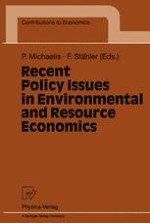Peter Michaelis and Frank Stahler This book deals with recent policy issues in environmental and resource economics. To collect articles on recent policy issues is of course always also a question of taste. This volume tries to represent a broad range of papers which covers the double dividend hypothesis, the role of non-profit organizations for environmental policies, trade implications and international environmental agreements. It consists of two parts, a part on domestic policy issues and a part on international policy issues. A separate part on international policy issues would not have been on the agenda when this volume would have been published two decades ago. But international and global environmental problems are different from purely national problems and deserve a special approach. However, also domestic policies face new challenges. One new focus of domestic policies is the discussion on the relationship between environmental benefits and other policy objectives. 'Some Remarks on the Double Dividend Hypothesis' by Christian Scholz deals with this discussion. In opposition to a number of recent papers it is found that the possibility for a double dividend depends largely on the substitutability characteristics of taxed commodities.
